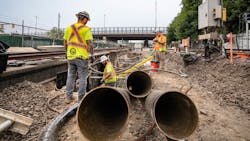MBTA launches Track Improvement Program
The Massachusetts Bay Transportation Authority (MBTA) has launched its Track Improvement Program, a major, bold initiative to eliminate all existing speed restrictions and fix tracks closer to a state of good repair by the end of 2024. The program is part of the MBTA’s broader efforts to “Rebuild, Restore and Reimagine” the public transit system.
The MBTA’s new program to fix the tracks will involve a wide range of work, including spot repairs, tie replacements, rail replacement and ballast replacement. The MBTA will also be expanding its engineering teams and engaging specialized rail contractors to execute the work efficiently. The MBTA will schedule Track Improvement Program work during nights, weekends and shutdown periods to minimize service, time and cost impacts.
The MBTA will host “open houses,” held in-person and virtually, to provide an overview of projects and allow riders, residents and communities an opportunity to ask questions or share comments and feedback. The MBTA will also provide regular updates to customers on the progress of the work and any potential service disruptions through various channels, including, but not limited to, in-station signage, social media, T-Alerts and the MBTA website.
“By restoring our tracks, we are addressing the root causes of the speed restrictions that have accumulated over decades,” said MBTA General Manager and CEO Phillip Eng. “Our efforts to rebuild track infrastructure across the Red, Orange, Blue and Green Lines will improve train speeds substantially, reduce delays and disruptions, enhance safety and deliver timely, reliable and consistent service for riders. Our team is deeply committed to seeing this through and we thank the public for their patience as we move the MBTA forward. We will have a robust open house schedule to ensure the public has an opportunity to ask questions and learn more about the various projects throughout the year.”
Speed restrictions are limitations on the speed at which trains can travel to ensure the safety of riders and workers. According to the MBTA, existing speed restrictions total 191 as of Nov. 6. This year, the program aims to address 39 speed restrictions to further reduce travel times. By the end of 2024, the plan endeavors to revitalize more than 27,900 railroad ties and 124,880 feet of track to improve safety and reliability. More than 208,000 feet of tamping (a process used to pack the track ballast under railway tracks to make the tracks and roadbed more durable and level) will help smooth riding surfaces and allow for more comfortable, efficient train operations.
“From day one, Gov. [Maura] Healey and Lieutenant Gov. [Kim] Driscoll have been clear that a safe, reliable public transportation system is essential for a strong economy and strong communities. With this plan, General Manager Eng and the MBTA team are showing our clear commitment to tackling these challenges head on,” said Massachusetts Department of Transportation Acting Secretary and CEO Monica Tibbits-Nutt. “This is a bold and ambitious plan but it is one that is necessary to ensure the long-term safety and reliability of the MBTA system. We are committed to working with the MBTA to make this a success.”
The MBTA is in the process of finalizing alternate service options for riders, which may include accessible shuttle bus service, providing amplified service on alternate modes and utilizing existing services like Commuter Rail options. The MBTA will share finalized details regarding these alternate modes of service once the plans have been finalized and confirmed.
The MBTA has been focused on recruitment, retention, skills training and leadership development to cultivate the workforce needed to operate and maintain a modern transportation system. The MBTA has invested in restructuring the senior leadership team, improving safety protocols, engineering, planning, frontline teams, workforce development and training to ensure employees are ultimately fulfilling their responsibilities in the most effective way possible.
The authority has exceeded hiring nearly 1,200 employees in just 2023 alone, surpassing a goal set by the Healey-Driscoll Administration, whose investment of $20 million in the supplemental budget supported the Local 589 Agreement, which was critical to the MBTA’s hiring efforts.
The tentative 2023 and 2024 construction work schedule can be found on MBTA’s website.
